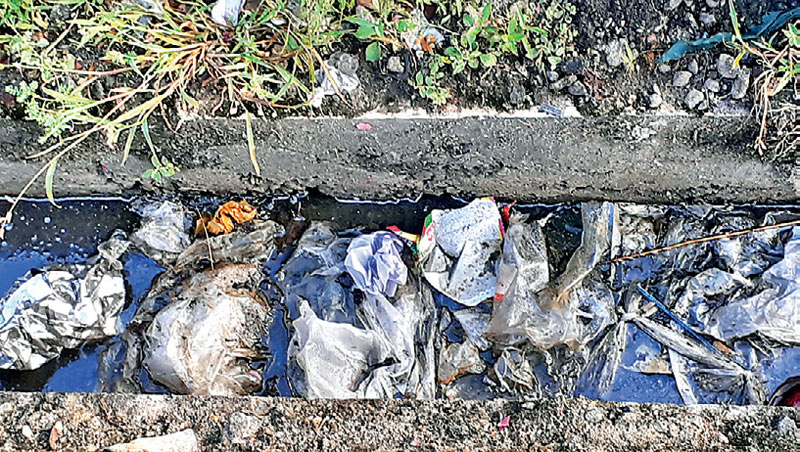Friday Feb 20, 2026
Friday Feb 20, 2026
Thursday, 2 February 2023 00:48 - - {{hitsCtrl.values.hits}}

Garbage dumped in the public parking area
|
By Randima Attygalle
|
Food stalls obstructing the scenic beauty
|
The careless disposal of waste by commuters, vendors and certain business premises of the area are threatening the waterways and the ecosystem of Thalawathugoda which is home to several protected wetlands.
A much-sought-after area for bird watching, walking paths, jogging tracks and plant nurseries, Thalawathugoda’s scenic beauty is seriously threatened by mountains of garbage collected on roadways and non-degradable plastic bottles, beer cans, polythene and food containers dumped into the drains skirting the walking path which runs through Kimbulawala junction across the New Hospital Road.
Face masks, yoghurt cups and water bottles carelessly thrown by commuters and those now frequenting the ‘street food’ strip bordering the walking path end up in the adjacent lakes and paddy fields. This washed away garbage is a serious threat to the wildlife which feeds on it and also to the ecosystem of the area.
Street food stalls
The street food stalls which have now become popular in the area too are irresponsibly disposing of their waste. Although a few have installed bins for the customers and are responsible for the surroundings, a good many are without them. “Come Monday, the drain along the walking path is one common garbage pit as food stalls are up from Friday to Sunday,” a regular jogger and a resident of the area said. Some food vendors are also alleged for emptying their used oil cauldrons (used for deep frying of meats) to the grass patch bordering the jogging trek.
|
|
Thalawathugoda Post Office area - a dengue-breeding ground |
Unresponsive authorities
While the Urban Development Authority (UDA) is responsible for the cleaning of the drains, Sri Lanka Land Development Corporation (SLLDC) is responsible for cleaning of the internal waterways. Although authorities of the UDA have been often alerted by nature-loving residents of the area to introduce a mechanism to regulate the waste disposal of the food stalls which have come up, all pleas have fallen on deaf ears, the residents of the area charge. These food stalls by the road have now become permanent fixtures although they come to life at night and mostly over the weekends.
“The panoramic view we used to enjoy of the paddyfield and the waterways filled with lotus and water lilies are now obstructed with these structures and to make matters worse, most vendors and those who patronise them litter the area with no regard to the environment. This is nothing but raping of the natural habitat,” an angry resident charged. Ironically this walking path and the jogging track is patronised by many MPs and Ministers who conveniently turn a blind eye to the destruction of the habitat.
The cleaning personnel of the SLLDC pull out tons of non-degradable waste including e-waste from waterways in the area which flow through drains. “It is shocking what these people are capable of just tossing to waterways,” said one SLLDC employee who recollects pulling out broken electronic devices and even broken chairs.
|
|
The pavement in the town turned into a garbage pit
|
Dengue breeding grounds
Many public places in the Thalawathugoda town have also become dengue-breeding grounds. The drains skirting the Thalawathugoda Post Office are clogged with polythene and plastic. The Thalawathugoda town has become an eyesore with mounting garbage pits right in the middle of the town. Many eateries conveniently empty their waste to the roadways including the pavements putting pedestrians in great inconvenience. On rainy days the garbage is washed along the roads. According to the latest Weekly Dengue Update issued by the National Dengue Control Unit of the Ministry of Health, Maharagama MOH area within which Thalawathugoda comes under, is among the dengue high-risk areas within the Colombo District.
|
|
The rich eco-system of the area at stake
|
Garbage on pavements
Maharagama Municipality which is responsible for waste collection in the area allege the eatery owners to be disposing their daily waste conveniently to the roadways without taking pains to properly dispose of it to the Municipality lorries. “We are not responsible for man-made garbage pits along the main road. We are only obliged to collect waste at homes or business premises and not bags of garbage thrown away from passing vehicles,” they say.
Despite sorting of waste into degradable and non-degradable by some residents, the waste is carelessly thrown together into the Municipal lorries, complain some residents. This is contrary to the practice by several other municipalities which strictly adhere to sorting of waste. Despite many sharamadanas initiated by residents and business owners in Thalawathugoda area to keep their surroundings clean, callous behaviour of many keeps the never-ending waste issue alive.
|
|
Plastic washed to the waterways
|
Home to protected wetlands
During the 13th Conference of the Parties to the RAMSAR Convention on Wetlands (COP13) in Dubai in 2018, Colombo was also accredited as a RAMSAR wetland site, the only capital city in the world to receive such accreditation. The wetlands of Colombo include Beddegana, Diyasaru, Heen Ela, Kolonnawa, Kotte, Madinnagoda, Mulleriyawa and Thalangama. While Diyasaru wetland lies in Thalawathugoda itself, the rest is also within close proximity to this highly residential area rich in wildlife.
Clogging of drains with waste which eventually ends up in waterways threaten the wetlands of the area which act as buffers against floods and natural water and air purifiers. These wetlands also contribute to urban biodiversity, urban food security and other livelihoods. Unless serious measures are taken by watch-dogs of the environment, a priceless eco-system and the quality of living of many nature-loving and law-abiding citizens are at stake.

The drains behind the street food stalls clogged with waste